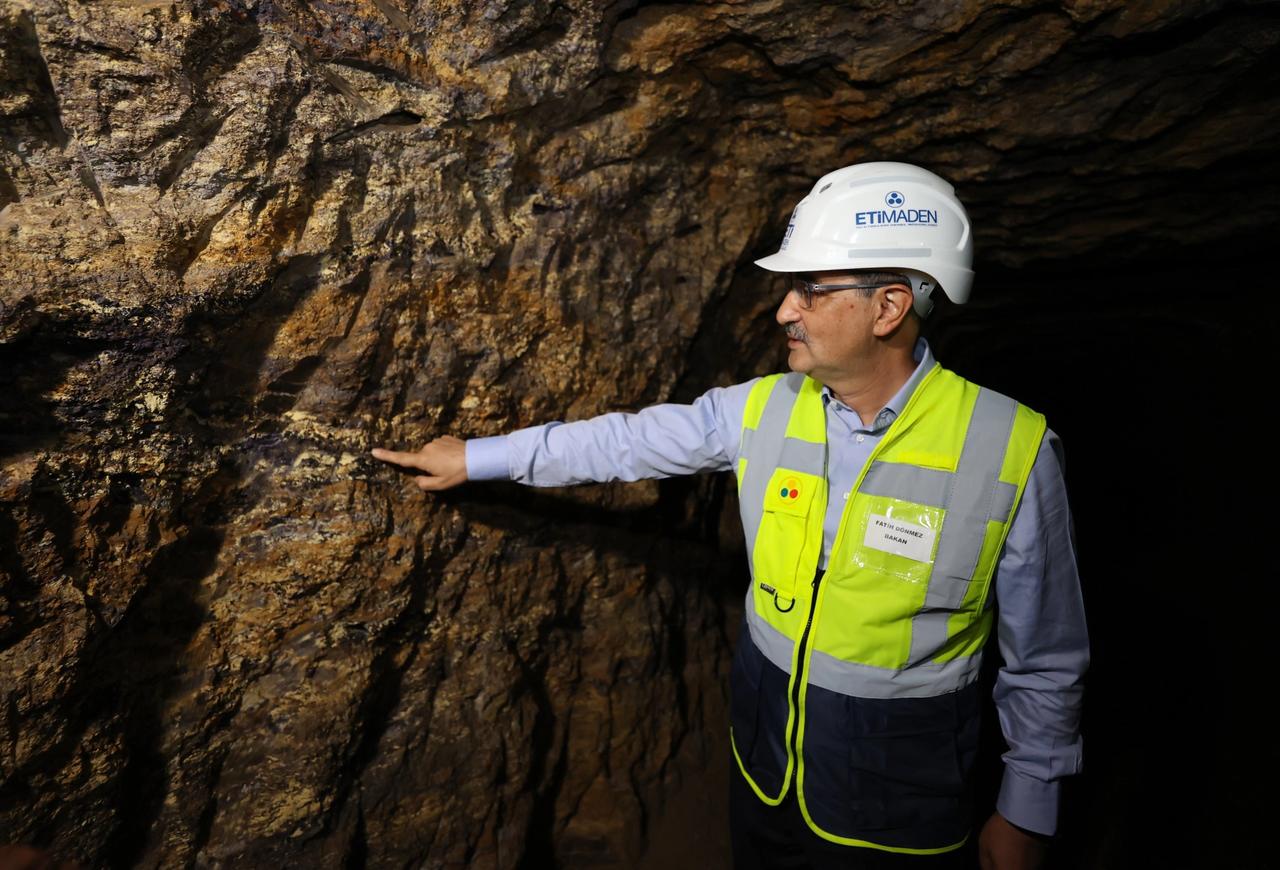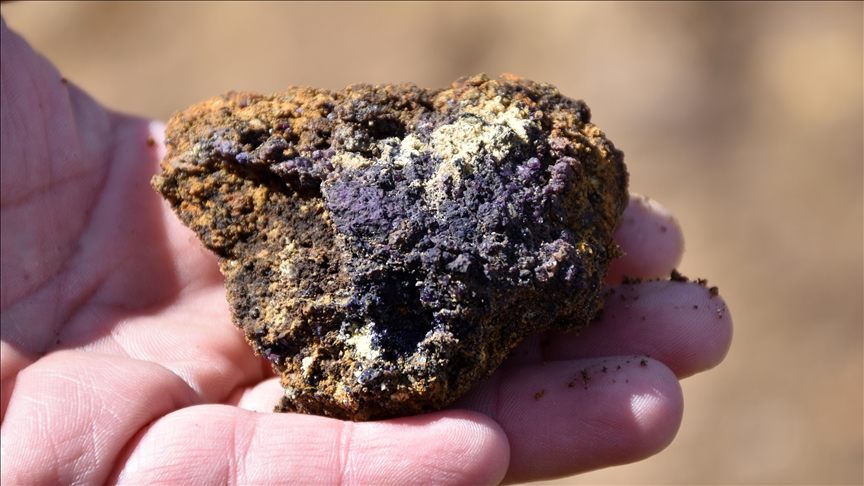
Over the last few months, U.S. President Donald Trump reignited global attention on rare earth elements (REEs) after signaling interest in Ukraine’s untapped reserves.
The move underscored the broader geopolitical reality of the importance of strategic assets, the REEs. From defense systems and electric vehicles to renewable energy infrastructure, minerals have become the power of the 21st century.
As the global scramble for secure and diversified rare earth element (REE) supply chains intensifies, Türkiye is increasingly standing out with its aim to turn its reserves into geopolitical and economic leverage.
In recent years, rare earth elements have become a central focus of geopolitical competition, particularly between the United States, China, and other global powers.
Among them, China currently controls more than 60% of the global supply of REEs, including refining and processing capacity, giving it significant leverage over the global supply chain. This dominance has prompted other countries, including the United States and those in Europe, to seek alternative sources of these crucial minerals.
For decades, China has leveraged its vast rare earth resources to shape the global supply chain and influence the pricing of rare earth elements (REEs).
In addition to its production capacity, China’s dominance is reinforced by policies such as production quotas and export restrictions, which allow it to influence global markets. For example, during the 2010 Diaoyu/Senkaku Islands dispute between China and Japan, China restricted the export of REEs to Japan, causing significant disruptions in Japan’s high-tech industries and demonstrating the geopolitical power of these minerals.
As China’s hold over rare earths continues, countries like the United States, Japan, and the European Union have accelerated their efforts to diversify their supply chains. The push for alternative sources has led to increasing investments in rare earth exploration and production.

Last year, Türkiye joined the Minerals Security Partnership (MSP) forum to cooperate with other global powers.
“Türkiye approaches its mining strategy through a multidimensional lens,” says Dr. Izzet Ari, a faculty member at Ankara Social Sciences University. “Key pillars include improving the investment environment, expanding domestic exploration, and transforming raw materials into intermediate and final products to boost added value. All of this is done under a comprehensive management system aligned with sustainable development principles.”
Türkiye’s strategy involves not only extracting and processing these valuable minerals but also moving up the value chain by refining and manufacturing rare earth-based products.
Currently, Türkiye is working on developing a pilot facility with a production capacity of 10,000 tons of rare earth oxides (REOs) annually. The goal is to scale up production significantly, with plans to establish an industrial plant capable of refining 570,000 tons of REEs per year.
This would position Türkiye as a key player in the European market, providing critical minerals for industries ranging from defense to renewable energy.
“Initiatives like the Beylikova pilot plant, which will process 1,200 tons of REO annually, and the Eskisehir Kirka facility for lithium carbonate production, demonstrate that Türkiye is making concrete strides in this direction,” adds Dr. Ari. “These are not just experimental. They signal a shift towards building a self-sufficient and export-capable rare earth supply chain.”
Besides production, Türkiye is actively engaging in international mining ventures, expanding its footprint in Africa and Asia through the MTA International Mining Corporation, aiming to secure additional sources and diversify geopolitical risks.
Türkiye's increasing reliance on high-tech defense systems presents another critical reason for the country’s focus on rare earth elements. Modern defense technologies, including missile guidance systems, radar systems, and advanced electronics, all rely heavily on rare earths. These elements are used to produce strong permanent magnets for motors, sensors, and other key components of defense systems.
By investing in the development of its rare earth reserves, Ankara can reduce its dependence on foreign sources of these critical materials, ensuring the continuity and security of its defense technology supply chains. This shift toward self-sufficiency in rare earth production aligns with the nation’s broader national security goals, particularly as the country continues to enhance its indigenous defense capabilities.
Dr. Ari notes that “ensuring supply security for strategic minerals is central to national policy. This is not only about economics but also about reducing foreign dependency, especially in sectors like defense where material control is vital to operational sovereignty.”

In addition to its defense applications, rare earth elements are crucial for the transition to renewable energy. The global push for green energy technologies, such as wind turbines and electric vehicles, is driving up the demand for rare earths. These minerals are essential in the production of high-performance magnets used in wind turbines and electric vehicle motors, which are key components in achieving carbon-neutral growth and sustainability.
Türkiye has recognized the importance of rare earths in its own energy transition. As the country seeks to increase its renewable energy capacity and reduce its carbon footprint, access to these critical materials is already playing a significant role in its efforts.
By securing a stable and sustainable supply of rare earths, Türkiye has the potential to position itself as a leader in the green energy revolution, first regionally.
“The emphasis on rare earths reflects a broader ambition: to strengthen national value chains and reduce dependence on imported intermediate products,” explains Dr. Ari. “Whether it’s green tech, defense, or smart electronics, the ability to process and utilize critical materials domestically is becoming a cornerstone of Türkiye’s development vision.”

While Türkiye’s potential in the rare earth market is significant, there are several challenges the country must overcome to fully realize this potential. First, the extraction and processing of rare earth elements require advanced technologies and substantial capital investment. The infrastructure needed for large-scale mining and refining is complex and costly, requiring both government and private sector involvement.
Moreover, environmental concerns related to the mining and processing of rare earths cannot be overlooked. As Türkiye looks to develop its rare earth industry, it must carefully manage the environmental impacts of these activities.
Sustainable mining practices, waste management, and the development of green technologies for recycling and reusing rare earths will be essential in ensuring that Türkiye’s rare earth industry is both economically viable and environmentally responsible.
“In recent years, Türkiye has established a national mine rehabilitation information system to monitor socially responsible practices and identify rehabilitated mine sites across the country,” says Dr. Ari. “This is part of a wider shift toward integrating environmental and occupational safety compliance into mining strategy.”
Over the next decade, Türkiye has the potential to emerge as a major supplier of rare earths to both regional and global markets, particularly in Europe.
“Institutions like the Türkiye Wealth Fund (TVF) are actively channeling investments into the mining sector to reduce import dependence and improve Türkiye’s trade and current account balance,” Ari highlights.
To achieve its goals, Türkiye should focus on building strong partnerships with other countries and international organizations to ensure the stability and security of its rare earth supply chains.